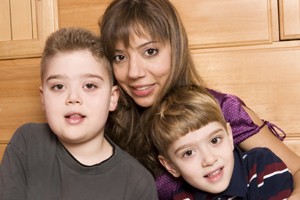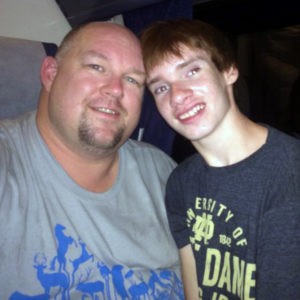
When a child enters the Wisconsin foster care system, they are most often placed in a licensed county foster home unless placed in the home of a relative. If a child is part of a larger sibling group, they may or may not be placed in the same foster home as their siblings. Placement is dependent on available foster homes that would meet the needs of the child at the time a child enters foster care. Many county homes are not suited to care for more than one child or children with significant trauma. In part because the necessary training and support are not available to foster parents which equip them for the challenges that come with trauma. Quite often a child’s emotional, behavioral, and functional needs are not fully known upon the initial placement. It can sometimes take months for a county foster parent and/or placing foster agency to learn the depth of trauma, the significance of delays, and the full effects of a child’s abuse or neglect. When trauma is recognized, discussion of treatment foster care may begin.
After the needs of a child are determined and if the child is in need of additional care above what a county foster home can offer, the child may be referred to treatment foster agency like Community Care Resources. In the state of Wisconsin, over 20% of children in foster care are placed in treatment foster homes. Treatment foster care offers children with significant trauma a safe environment where healing can begin to take place and foster parents have the tools to properly care for children. Foster parents are highly trained in trauma-informed care and participate in the child’s individualized treatment plan. Characteristics of children in treatment foster care might include the following:
Trauma Informed Care – If you want to become a foster parent for children with significant trauma, there are specific foster care qualifications that must be met. In addition to the 6-hour online training required by Wisconsin, there are 30 hours of classroom training required. The majority of Wisconsin foster agencies require this training within the first two years of getting a foster license. CCR requires this training to be complete PRIOR to issuing a foster care license. The focus of our 30-hour foundation training is trauma-informed care. Providing new foster parents with the tools to care for children with significant trauma is imperative to a successful placement. Some of the training topics covered are:
Visit our foster parent training calendar for upcoming training opportunities.
Professional Support – The world of social work and child protective services is filled with high employee turnover. The opposite is true at Community Care Resources. Our Clinical Case Managers average an impressive 15 years of employment. Compare this to a national average of just over 2 years and the revolving doors in most foster care agencies and you will understand our dedication to foster parents, children, and families.
All CCR foster parents receive a weekly in-home visit by a Master's level clinician and have access to our 24/7 hotline. Each week, a Clinical Case Manager visits with foster parents to review the week's happenings, problem solve, find solutions and support the foster parent in any way needed. CCR provides the support foster parents ask for and need, NOT what we think our foster parents need. These in-home, personal visits are critical for foster parents to understand the behaviors and emotions of their foster child and provide an opportunity to express frustrations, ask questions, and get the help and support they deserve. Having a dedicated professional to lean on is why CCR foster parents are able to successfully help their foster children heal from significant trauma. Most foster children have struggled in previous placements, have bounced from house to house, been separated from siblings, or have struggled to build and maintain healthy relationships in the foster home. Most often, it is simply because foster parents lack trauma-informed care training and support services, NOT because the child is too difficult or unmanageable.
Matching children and foster families – The need for additional treatment foster homes in Wisconsin continues to grow at an alarming rate. As more and more children and sibling groups are referred to treatment care by their county agency of origin, there just aren’t enough homes to provide the necessary care and supervision. Over the past 20 years, it has been increasingly difficult to recruit treatment foster parents with flexible schedules. Foster parents must be available to their kids before and after school, on school breaks and over summer vacation. Many require additional supervision and require consistent weekly routines. Weekly visits and biological family visits are held during normal business hours. Medical appointments, therapy visits, continued education opportunities are also held on weekdays. For many Wisconsin households, this kind of availability isn’t possible, however, it is a foster parent requirement that CCR does not waive.
CCR staff does a thorough job of educating prospective foster parents on the rewards and challenges of the kids in our care. Some families we speak with will choose to license with their county to foster non-treatment kids not understanding that treatment level kids are prevalent in the county system. The odds that a county foster family will accept a “treatment level” child and not know it is high. The family will discover weeks or months into the placement that the child might be best served in treatment level care. An overwhelmed foster family will give written notice to have the child removed and the child bounces to yet another foster home compounding their trauma. Until the child is properly assessed, he or she will not receive the care and treatment they deserve and require to begin healing from their abuse and/or neglect. Sadly, many kids will continue to be separated from their siblings or remain in county foster care because their needs are never recognized or properly assessed.
Foster parents are welcome to express their preferences when it comes to age, gender, behaviors, etc. CCR honors the requested preferences to help ensure successful placements. Families who choose to provide treatment care can have an enormous impact on the lives of children. They can watch children grow, heal, learn and thrive. Many can watch healing happen just by uniting siblings into one safe, healthy home. It takes a tremendous amount of patience, resilience, flexibility, humor, and love to be part of treatment foster care. CCR currently has foster families in over 30 Wisconsin counties, serving over 115 children. The need for additional foster homes is great. The rewards of being a foster parent are even greater! You can be part of the healing and offer a child a future of hope and promise. Learn how to become a foster parent in Wisconsin with CCR

